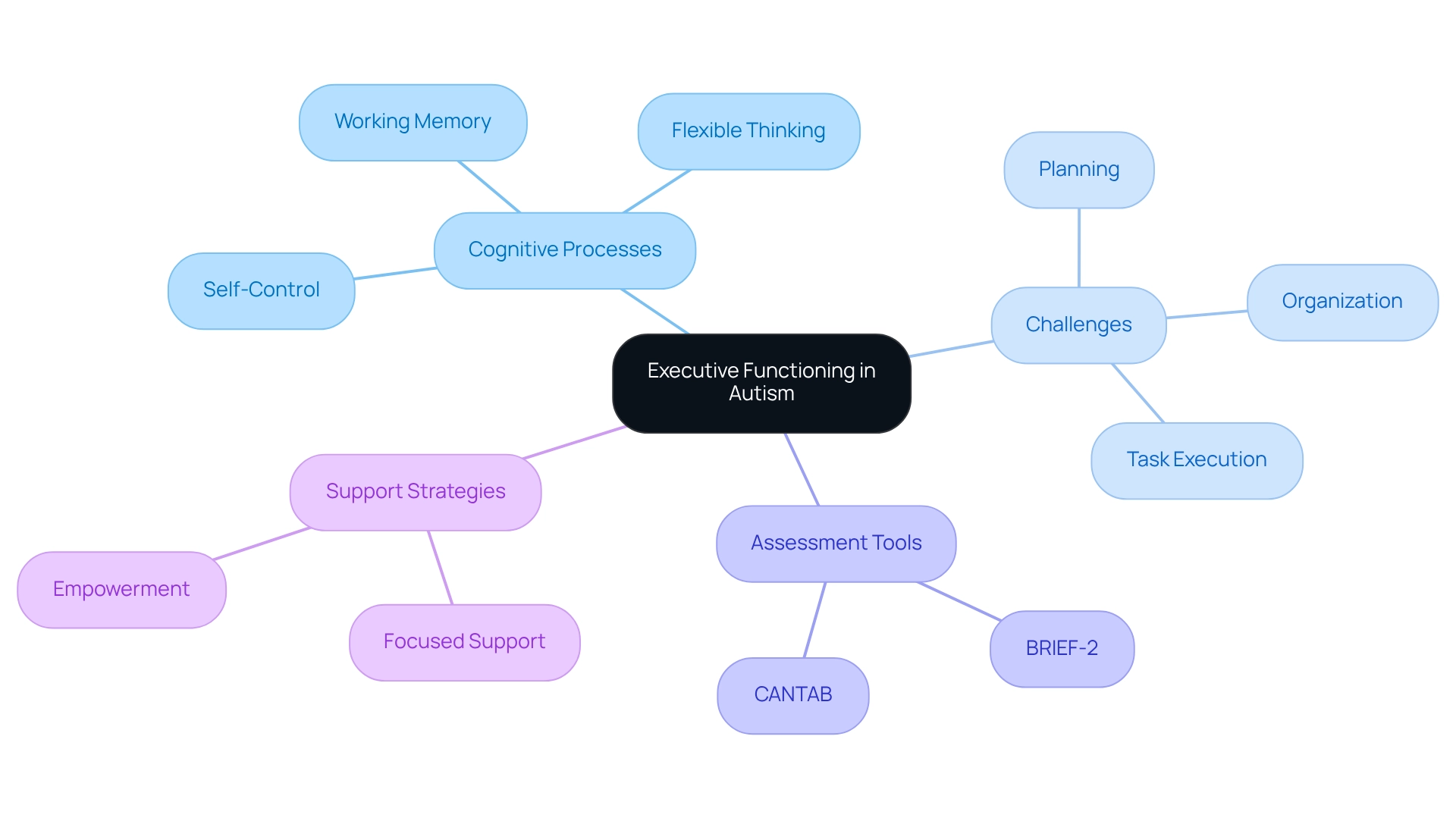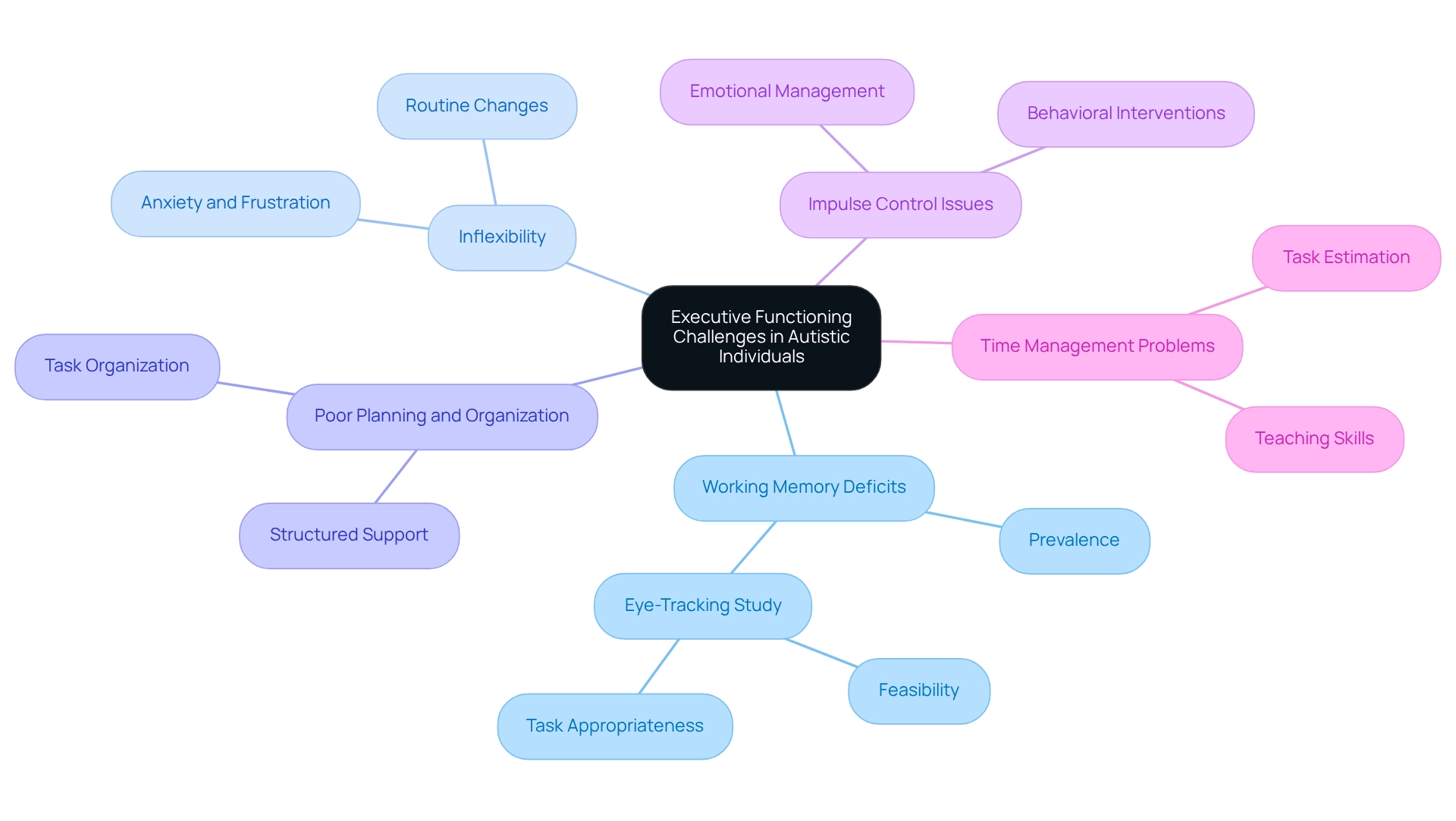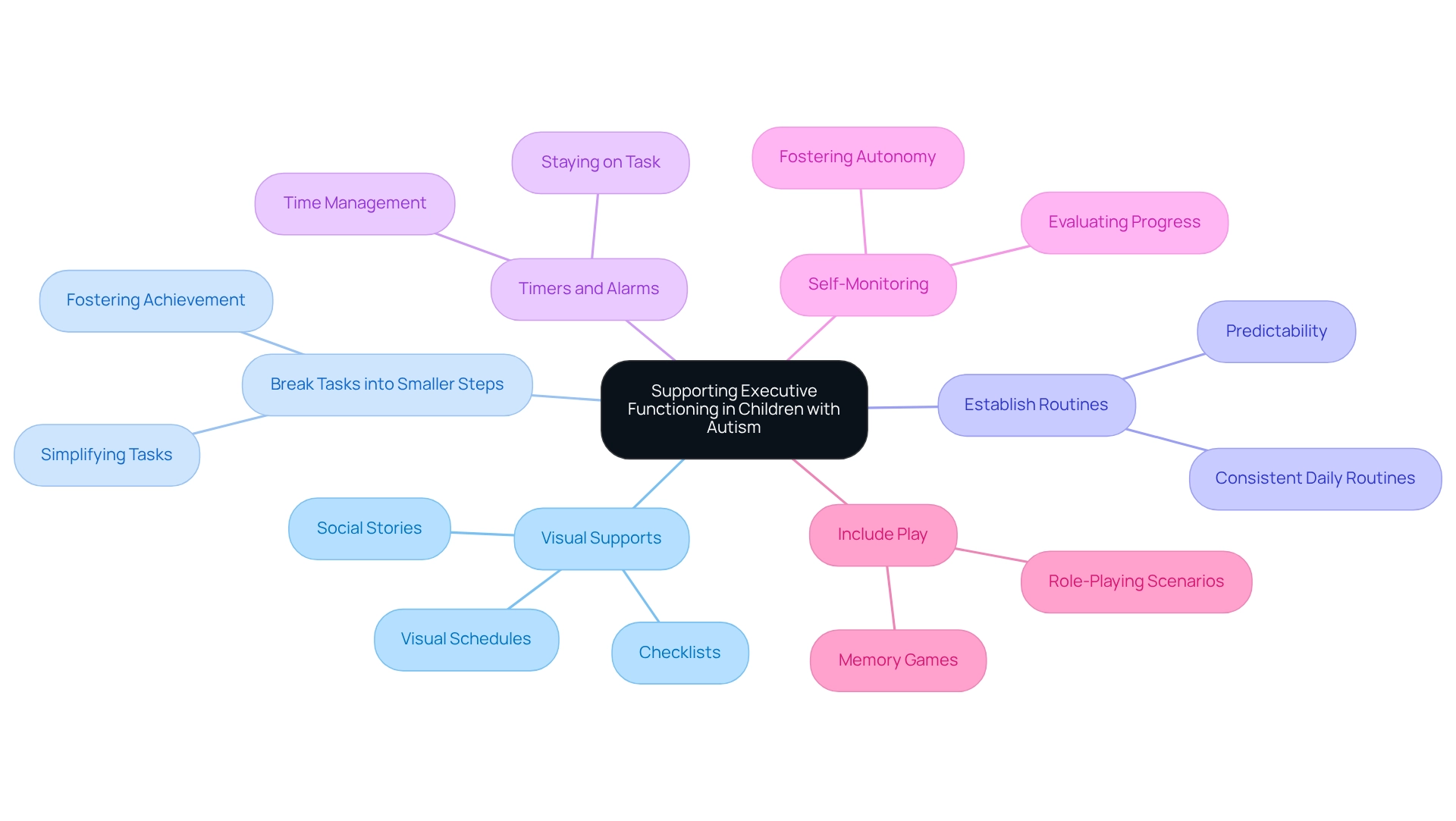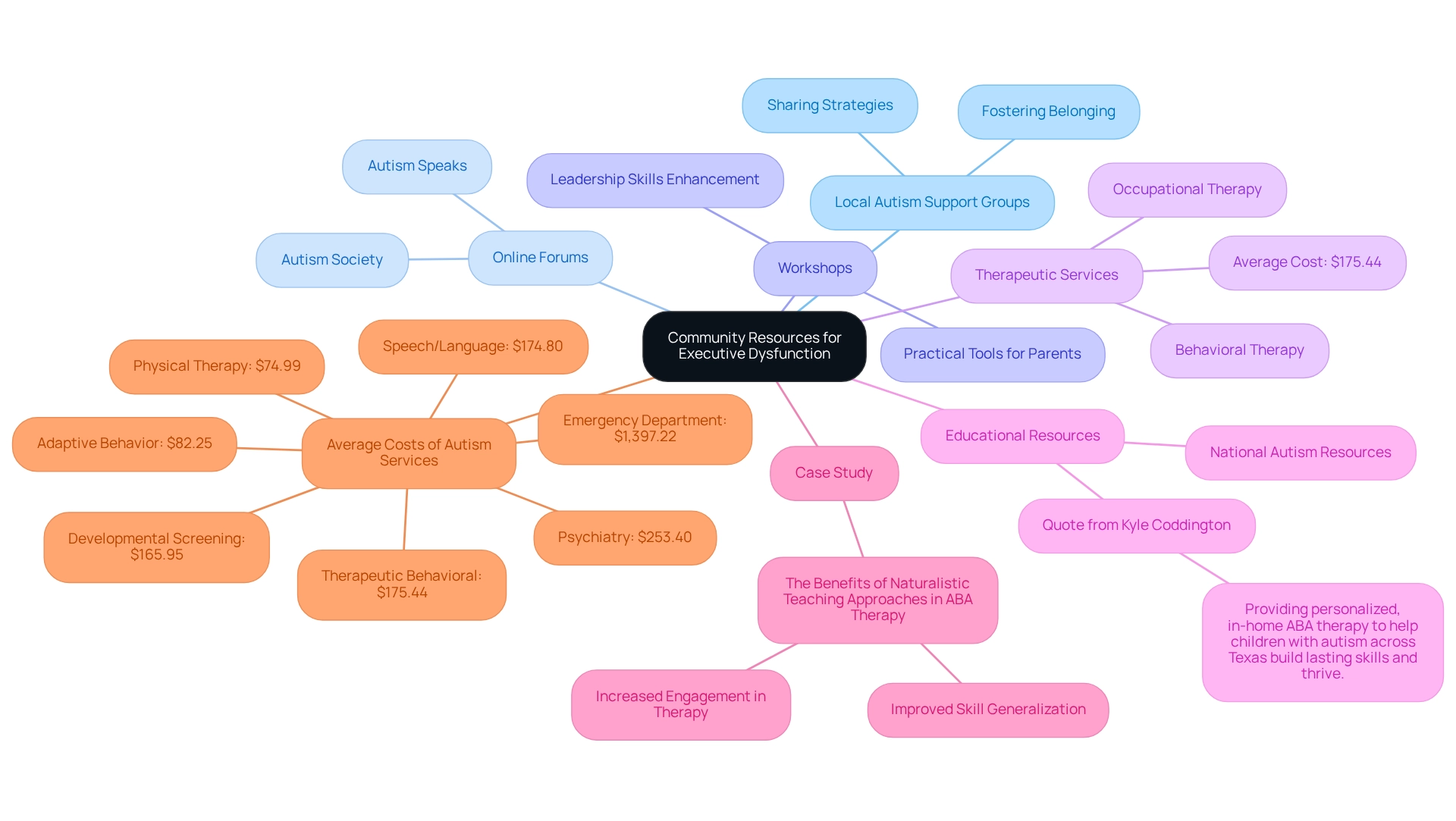Overview
Managing autism and executive dysfunction in children can feel overwhelming, but there are effective strategies that can make a significant difference. By utilizing visual supports, breaking tasks into smaller steps, establishing routines, and encouraging self-monitoring, parents can create a nurturing environment that addresses specific cognitive challenges. These approaches not only help children with autism navigate their daily lives but also foster growth and self-sufficiency.
Imagine the relief of seeing your child thrive as they gain confidence in their abilities. These strategies promote overall well-being, allowing children to flourish in their unique ways. As parents, it’s essential to embrace these methods and support our children in their journey. Together, we can cultivate an atmosphere that encourages independence and happiness.
Introduction
In the world of autism, executive functioning is crucial in shaping a child's ability to navigate daily life and achieve personal goals. This intricate set of cognitive processes—such as working memory, flexible thinking, and self-control—often presents unique challenges for children on the spectrum, affecting their learning and overall well-being. Research shows that a significant majority of autistic children struggle with executive function disorders, making it essential for parents and educators to understand these difficulties. By exploring effective strategies and community resources, caregivers can create an environment that not only addresses these challenges but also empowers autistic children to thrive and embrace their unique journeys.
Define Executive Functioning and Its Importance in Autism
Executive functioning encompasses a range of cognitive processes, including working memory, flexible thinking, and self-control. These abilities are crucial for managing daily tasks and achieving personal goals. However, for young individuals with developmental disorders, these skills can be greatly hindered. This often leads to difficulties with planning, organization, and task execution. It's important to recognize that approximately 80% of youngsters with autism and executive dysfunction encounter function-related disorders, which can significantly impact their ability to manage time, accomplish tasks, and adapt to new circumstances.
For instance, research indicates that youngsters with ADHD-C experience more pronounced inhibition issues compared to their ASD peers, highlighting a spectrum of cognitive challenges. Understanding these challenges is vital for both parents and professionals. By grasping the intricacies of these cognitive processes, we can work together to create focused support strategies that empower young individuals to navigate their surroundings more effectively.
Moreover, recent discoveries underscore the importance of integrating genetic, neuroimaging, and clinical evidence to deepen our understanding of the shared phenotype of ASD and ADHD. This approach highlights the complexity of cognitive processes within these groups. Tools like the BRIEF-2 and CANTAB evaluations serve as valuable instruments to assess various aspects of cognitive control, providing insights into the specific difficulties faced by these young individuals.
By addressing these challenges, we can cultivate an environment that fosters growth and self-sufficiency for young individuals facing autism and executive dysfunction. As Debra Muzikar wisely stated, "Autism is not a roadblock but a detour to a different destination, filled with unique opportunities." This perspective encourages us to view these challenges not as obstacles, but as pathways to understanding and support.

Identify Executive Functioning Challenges in Autistic Individuals
Children with developmental disorders, particularly those related to autism and executive dysfunction, often encounter various executive functioning difficulties that can significantly impact their daily lives and educational experiences. These challenges can be daunting, but understanding them is the first step toward fostering growth and success.
Working Memory Deficits: Many children with autism find it challenging to hold information in mind while using it, which can impede their learning processes and task completion. Recent findings indicate that these deficits are prevalent, with studies revealing that approximately 70% of individuals with autism and executive dysfunction experience difficulties in this area. A case study titled 'Eye-Tracking as a Tool for Measuring Working Memory in Youth' explored the feasibility of using eye-tracking technology to assess working memory in individuals with ASD, particularly those who are minimally verbal or developmentally delayed. The results demonstrated that eye-tracking can effectively gather data on working memory performance, although task appropriateness remains crucial for accurate assessment.
Inflexibility: Adapting to changes in routine or unexpected events can be particularly challenging. This inflexibility often leads to heightened anxiety and frustration. For instance, a young person may become upset if a scheduled activity is abruptly altered, highlighting the importance for caregivers to implement strategies that foster flexibility.
Poor Planning and Organization: Autistic individuals frequently struggle with organizing tasks, which can result in missed deadlines or unfinished assignments. This lack of organizational skills can be addressed through structured support and clear expectations, helping them navigate their responsibilities more effectively.
Impulse Control Issues: Many young individuals face challenges in managing their emotions and behaviors, leading to impulsive actions or outbursts. Recognizing these tendencies is essential for developing effective behavioral interventions that can help them thrive.
Time Management Problems: Estimating how long tasks will take can be particularly difficult, often resulting in procrastination or rushed work. Teaching time management skills can empower children to manage their time more effectively and reduce stress.
As Sohyun An Kim noted, "The information, content, and/or conclusions are those of the author and should not be construed as the official position or policy of, nor should any endorsements be inferred by HRSA, HHS, or the US Government." Identifying these leadership challenges is the initial step toward providing effective assistance and interventions tailored to the unique needs of youth with autism and executive dysfunction. By understanding these difficulties, parents and professionals can better equip themselves to create an environment that nurtures growth and success.

Implement Strategies to Support Executive Functioning in Children with Autism
Supporting executive functioning in children with autism and executive dysfunction can be a rewarding journey. By implementing thoughtful strategies, you can make a significant difference in their daily lives.
- Visual Supports are a wonderful tool to consider. Utilizing visual schedules and checklists helps children understand and adhere to their daily routines. Research shows that these visual aids can significantly reduce negative behaviors and enhance task completion. For example, social stories have proven effective in decreasing negative behaviors in students with autism, showcasing how visual supports can promote positive outcomes.
- Another effective approach is to Break Tasks into Smaller Steps. Simplifying tasks by dividing them into manageable steps not only reduces their intensity but also fosters a sense of achievement as children complete each step. This method nurtures their confidence and motivation.
- Establishing Routines is vital as well. Consistent daily routines provide the structure and predictability that can alleviate anxiety and enhance focus. By creating a routine, children learn what to expect, which improves their ability to participate in activities meaningfully.
- Consider using Timers and Alarms to assist children in managing their time effectively. This technique encourages them to stay on task and develop a better understanding of time management, which is a crucial skill for their growth.
- Encouraging Self-Monitoring is another key strategy. Teaching children to evaluate their progress and reflect on their performance fosters autonomy and responsibility—essential elements of higher-level thinking.
- Finally, don’t forget to Include Play. Engaging children in games and activities that enhance cognitive skills, such as memory games or role-playing scenarios, makes learning enjoyable while reinforcing essential skills in a practical context.
Collectively, these strategies empower children with autism and executive dysfunction to navigate their daily lives more effectively, enhancing their executive functioning capabilities and overall well-being. As Maureen Bennie, founder of ASD Media, beautifully states, "Education brings positive change to the lives of those impacted by conditions on the autism spectrum." By employing these strategies, we can foster an inclusive atmosphere that supports all individuals on the spectrum. Let’s work together to create a nurturing environment for our children.

Explore Community Resources and Support for Managing Executive Dysfunction
Many families find themselves navigating the challenges of autism and executive dysfunction in children, and numerous community resources are available to provide support.
- Local Autism Support Groups: In many communities, support groups exist where parents can come together to share experiences and effective strategies. These gatherings not only foster a sense of belonging but also offer valuable insights into overcoming challenges.
- Online Forums and Communities: Platforms such as Autism Speaks and the Autism Society create spaces for parents to connect, exchange resources, and find solace in the shared experiences of others facing similar hurdles.
- Workshops and Training Programs: Local autism groups and educational institutions frequently host workshops aimed at enhancing leadership abilities. These programs equip parents with practical tools to support their children's development.
- Therapeutic Services: Engaging with professionals who specialize in autism and executive dysfunction, including occupational and behavioral therapists, can lead to tailored strategies that address specific challenges. It’s important to note that the average cost of therapeutic behavioral services in the U.S. is $175.44, a consideration for families seeking assistance.
- Educational Resources: Organizations like the National Autism Resources provide a wealth of tools and strategies designed for both educators and parents, helping to create supportive learning environments. As Kyle Coddington, CEO of Prospera Healthcare, states, "Offering tailored, in-home ABA therapy to assist young individuals with developmental challenges throughout Texas in developing lasting skills and flourishing."
By utilizing these resources, families can access additional support and strategies that empower their children to thrive. Moreover, the case study titled "The Benefits of Naturalistic Teaching Approaches in ABA Therapy" illustrates how specific teaching techniques within community resources can lead to improved outcomes for children with developmental disorders. Families should also be mindful of the average costs of common autism services in the U.S., such as adaptive behavior at $82.25, developmental screening at $165.95, and speech/language services at $174.80, to better navigate their options.

Conclusion
Understanding and addressing executive functioning challenges in children with autism is essential for nurturing their growth and independence. The intricate relationship between executive functions—such as working memory, flexibility, and self-control—and daily life highlights the need for targeted support. Given that a significant majority of autistic children experience executive function disorders, it becomes crucial for parents and educators to recognize these challenges and implement effective strategies.
By utilizing visual supports, breaking tasks into smaller steps, and establishing routines, caregivers can foster an environment that encourages success and alleviates anxiety. Encouraging self-monitoring and incorporating play further enhance children's executive functioning abilities, making learning both enjoyable and effective. Additionally, the availability of community resources, including support groups and therapeutic services, opens up further avenues for families to access the assistance they require.
Ultimately, empowering children with autism to navigate their unique challenges not only aids their personal development but also enriches the communities they belong to. By fostering understanding and implementing supportive strategies, we can help these children thrive on their own terms, transforming perceived obstacles into opportunities for growth and achievement. Together, let us embrace this journey with compassion and commitment.
Frequently Asked Questions
What is executive functioning?
Executive functioning encompasses a range of cognitive processes, including working memory, flexible thinking, and self-control, which are crucial for managing daily tasks and achieving personal goals.
How do developmental disorders affect executive functioning in young individuals?
Young individuals with developmental disorders often experience hindered executive functioning skills, leading to difficulties with planning, organization, and task execution.
What percentage of youngsters with autism experience executive dysfunction?
Approximately 80% of youngsters with autism and executive dysfunction encounter function-related disorders that significantly impact their ability to manage time, accomplish tasks, and adapt to new circumstances.
How do ADHD and autism compare in terms of executive functioning challenges?
Research indicates that youngsters with ADHD-C experience more pronounced inhibition issues compared to their ASD peers, highlighting a spectrum of cognitive challenges between the two groups.
Why is it important to understand the cognitive challenges faced by these young individuals?
Understanding these challenges is vital for parents and professionals to create focused support strategies that empower young individuals to navigate their surroundings more effectively.
What tools are available to assess cognitive control in young individuals with autism and ADHD?
Tools like the BRIEF-2 and CANTAB evaluations serve as valuable instruments to assess various aspects of cognitive control and provide insights into the specific difficulties faced by these young individuals.
How can addressing executive dysfunction challenges benefit young individuals with autism?
By addressing these challenges, we can cultivate an environment that fosters growth and self-sufficiency for young individuals facing autism and executive dysfunction.
What perspective does Debra Muzikar offer regarding autism and challenges?
Debra Muzikar suggests that 'Autism is not a roadblock but a detour to a different destination, filled with unique opportunities,' encouraging us to view challenges as pathways to understanding and support.




